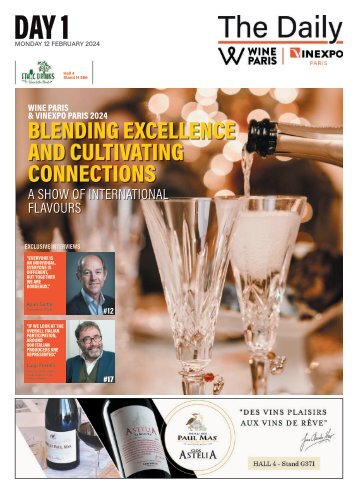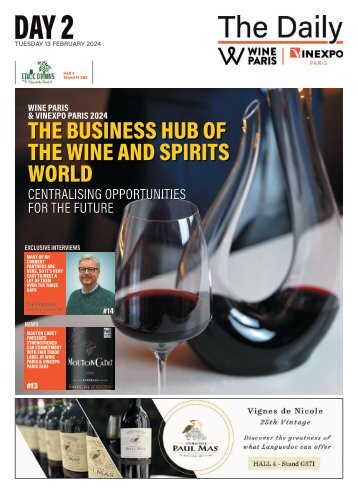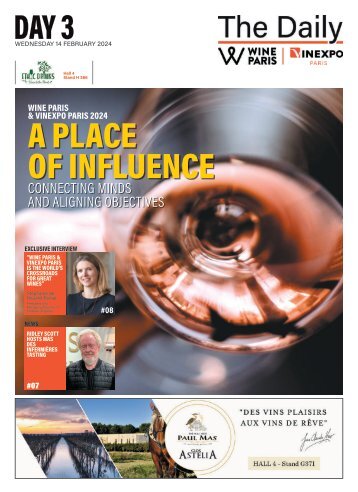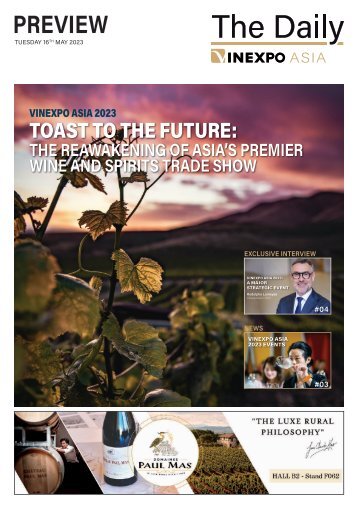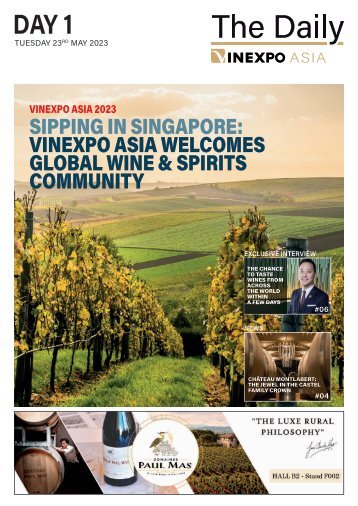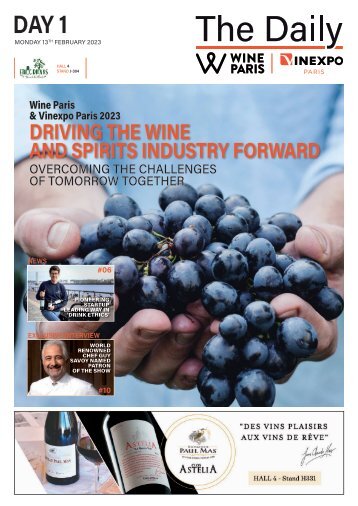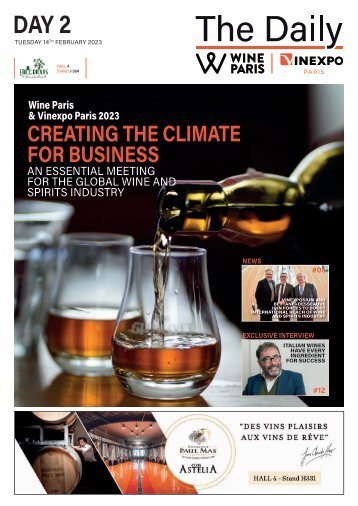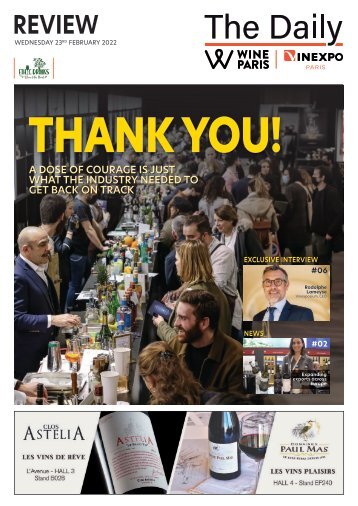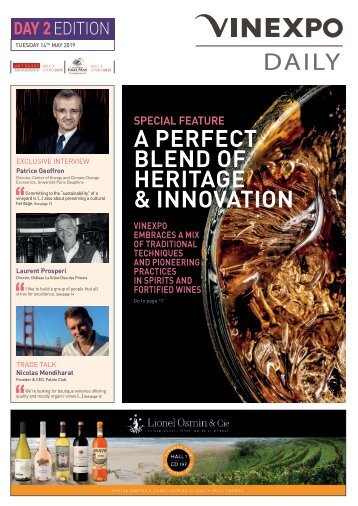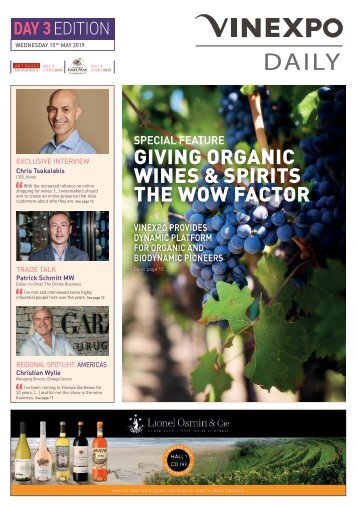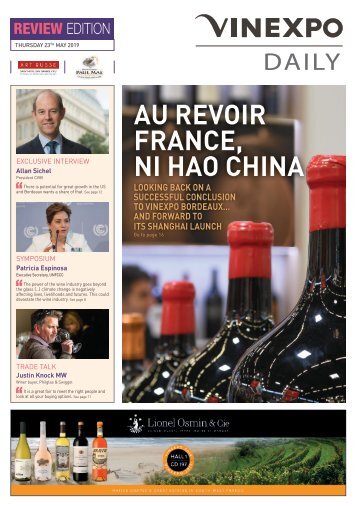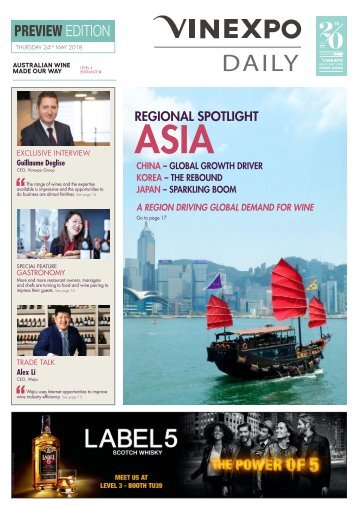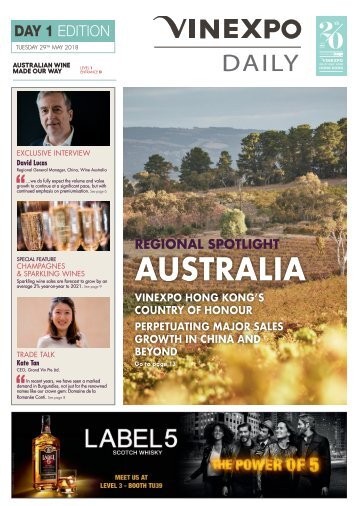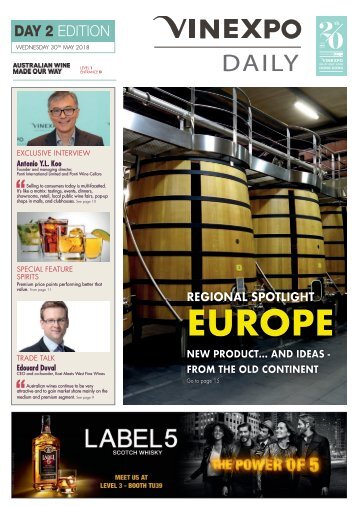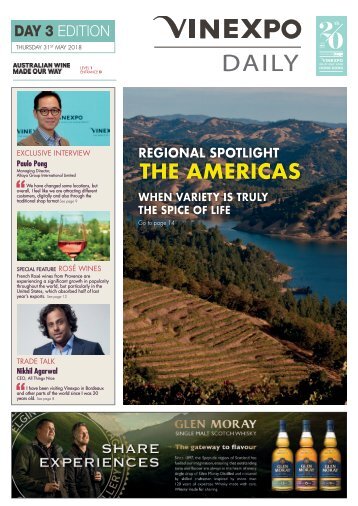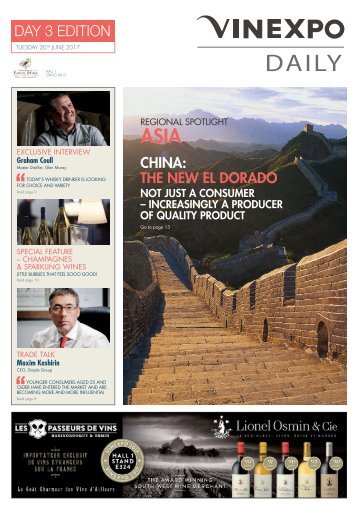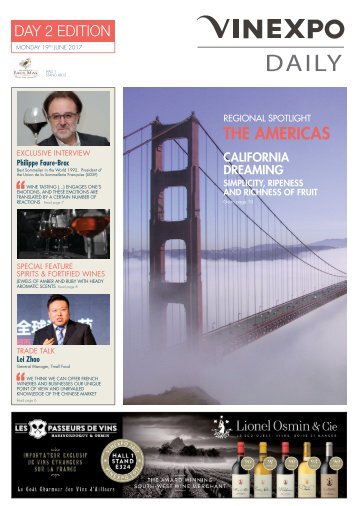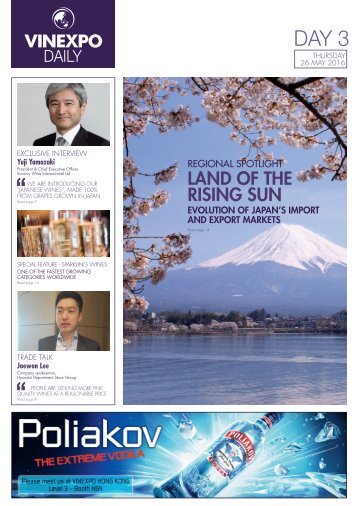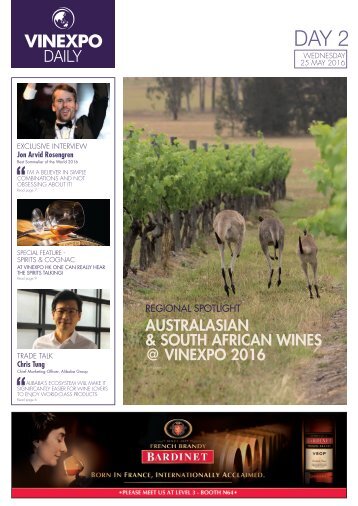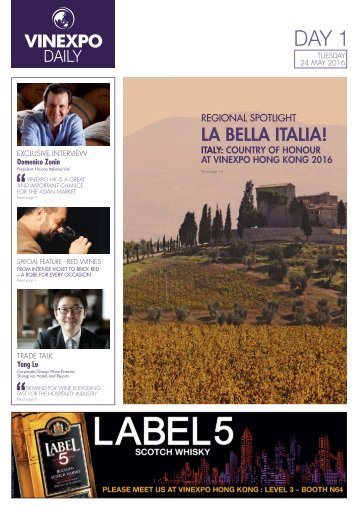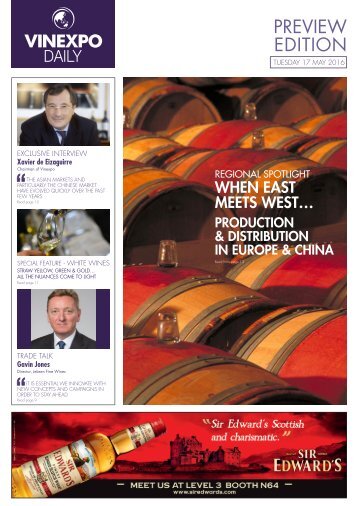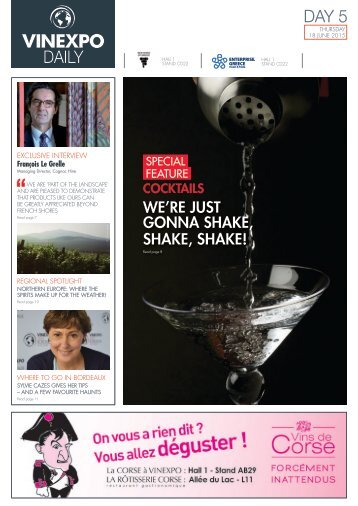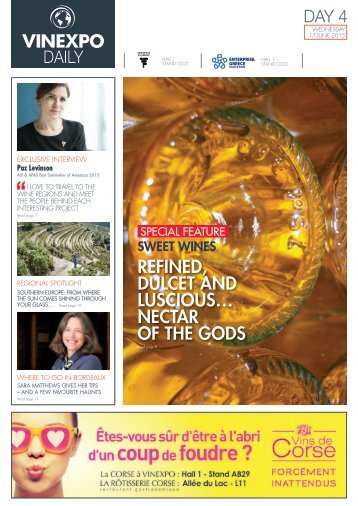Vinexpo Daily 2019 - Day 1 Edition
- Text
- Artrusse
- Palmer
- Osmin
- Dauzac
- Bordeaux
- Vinexpo
“The impact of climate
“The impact of climate change on the wine and spirits industry” For this first edition, Tuesday 14 th May 2019 from 10 am to 4:30 pm, the International Vinexpo Symposium “climate change and wine” will address the impact of climate change on the wine and spirits sector with conferences, debates and round tables. It will present current actions, possible solutions and technologies mobilised CLIMATE CHANGE: HOW IS AUSTRALIA FACING UP TO THE CHALLENGE Top executives of the Australian Wine Research Institute share insight Dan Johnson Managing Director, The Australian Wine Research Institute Dr Mark Krstic Business Development Manager, The Australian Wine Research Institute Dr Mardi Longbottom Senior viticulturist, The Australian Wine Research Institute PRACTICAL INFORMATION Tuesday 14 th May from 12:00 pm to 1:30 pm Hall 2, Room 8 Dan Johnson, Managing Director, Dr Mardi Longbottom, senior viticulturist and Dr Mark Krstic, business development manager of The Australian Wine Research Institute, give their collective insights into how the country and the wine industry specifically is tackling climate change in Australia. We asked them since when do they think wine authorities and the wine industry have taken the issue of climate change seriously? Australia is the world’s driest continent (other than Antarctica). Climate and weather have, therefore, been part of the national discussion for perhaps 30 years. It has become even more front of mind in the last 10 years as we have seen numerous temperature records broken, with many areas of the country recording their hottest years on record and some cities setting daily temperature records. As a result, climate – and its impact on agriculture, living standards – has been an increasing part of the policy agenda for political parties for many years. However, for various reasons nationallevel policy setting has been very difficult in this area. Several Prime Ministers have lost their jobs in part or in full because of their belief in or approach to dealing with climate change. The Australian grape and wine sector and its representative bodies have been discussing climate and implementing related programmes since the earliest days of Australian grape and wine production. The first formal industry-wide sustainability program was introduced in 2009. Many individual grape and wine companies had active programs in these areas for decades before this. In the last 10 years, several companies have taken major commercial decisions on the basis of climate-related risks and opportunities, including divesting or acquiring vineyards based on their altitude, latitude and/or access to water resources. What are the main threats to viticulture in Australia? As a very dry continent, one of the chief threats to Australian grape growing is water availability. The nation may have enough water, in particular regions, but it cannot easily be moved long distances. Temperature variability and extremes are also important. Periods of temperature extremes during summer days/nights can have a greater negative impact on yield and fruit quality. Frosts are now happening at a time when they pose the most risk to vines. Many growers and wineries have seen a trend of earlier harvests with many varieties ripening at similar times. Although these phenomena are serious and have significant potential to cause quality and economic losses, grape vines have shown tremendous resilience in the face of climatic changes. Which national organisations are most involved in tackling climate change? The national industry body, Australian Grape & Wine Incorporated and Wine Australia both have active programmes and policy positions on this subject. Australia has a highly coordinated approach to industry research and development. All grape growers and winemakers contribute to a collective research effort by national and regional governmental institutions, universities and the Australian Wine Research Institute (AWRI). What have been some of the results that you and the research teams have achieved? Australian researchers have led the world in areas such as: research and development of water efficient irrigation strategies. development of water use-efficient and saline-tolerant rootstocks better suited to Australian conditions. canopy management for improved bunch zone temperature management. understanding vine physiology and reproduction under elevated temperature and drought conditions. identifying and planting more heat- and drought-tolerant varieties, rootstocks and clones. Other outcomes have included: the diagnosis and management of smoke taint. management of problematic ferments caused by high must sugar and low yeast assimilable nitrogen content. energy efficiency investigations leading to smarter energy use in wineries, in particular in the area of refrigeration. feasibility assessments of alternative energy generation technologies. evaluation of alternative uses for grape marc as a feedstock for livestock to reduce greenhouse gas emissions annual benchmarking of carbon emissions (energy and nitrogen fertiliser) and water use by all members of Australian wine’s sustainability program 16 VINEXPO DAILY / DAY 1 / MONDAY 13 TH MAY 2019
TRADE TALK The view from Asia PRESS CORNER First year for Vietnam at Vinexpo Linh Pham Thi My Wine Director, T.K. Distribution Corporation Linh Pham Thi My, Wine Director at T.K. Distribution Corporation an importer and distributor of high quality beverages (Monin, Wines, Sake) headquartered in Ho Chi Minh City, Vietnam shares a bit more about her role. We taste, select and sell a diversified portfolio of wines from around the world. The company began with just a handful of brands in 1996 and has since grown to be a leading independent beverage distributor in the country. As Wine Director my role is to be the link between our wines vendors, our management and our teams, making sure that we’re effectively building our brands up in our dynamic South East Asia market place. What do you see as being the most important sales trends in your territory? Our trade channel is still very promising with the continual arrival of international luxury hotel brands in the country. In terms of wine sales trend we are still in a blockbuster red wine dominated market where Chile holds the strongest place, closely followed by France. We are paying very close attention to our Australian, U.S and Italian portfolios as well as focusing on premium and super premium wines where sales have been constantly growing for the past 4 years. What are you primarily looking for at Vinexpo Bordeaux? Our aim is to meet our key wine vendors, especially vendors from Europe and taste some recent released vintages. Do you attend any of the master classes or seminar sessions? If so, which ones and why? WE ARE STILL IN A BLOCKBUSTER RED WINE DOMINATED MARKET WHERE CHILE HOLDS THE STRONGEST PLACE, CLOSELY FOLLOWED BY FRANCE Due to our very tight schedule, I will unfortunately not be able to attend those events even though I would love to. What are your secrets for getting the best out of a busy Vinexpo? The best is to have a clear plan and organized schedule before heading to Bordeaux. During the day, we always make sure we are on track with the meetings and selected evening events. Thoughts on Vinexpo in general? Vinexpo is important to us. It’s THE place where we can meet our international wine vendors especially from Europe CLIMATE CHANGE… YES, IT’S REAL On Tuesday 14 May, a conference entitled “The impact of climate change on vineyard management and winemaking”, in partnership with Wine Spectator, will be hosted by CNN Paris Bureau Chief Jim Bittermann. We asked Jim how important it is to get this topic on the table at Vinexpo. It is very important, particularly because there is some scepticism in some parts of the world about whether or not climate change exists; but there is an acceptance in most places that it really does, and it’s something that is having an impact on everyone. I have already seen from my discussions with participants ahead of time that there is a fair amount of crosspollination that can be done between wine growers in one part of the world and those in another about their findings and the kind of adaptations they are developing. If we can foster discussion that crosses borders and is worldwide, that will be very helpful for everyone. There are some things going on in Australia, for example, that Europeans should hear about, and there are some things happening in Europe that people in California should hear about. And it’s not just winegrowers. Everyone in Jim Bittermann CNN Paris Bureau Chief the agricultural field should be concerned by this. Over the years as you have been reporting for CNN, what have you observed in terms of the evolution of extreme climatic events, and what are your personal thoughts about climate change? I am certainly a believer in climate change. I have been for years now, and I have seen the impact of climate change on rural populations in Africa. But I have also seen it right here in France. We have done stories about places, in the south particularly, that no longer can grow the kind of grapes they used to grow – or the kind of crops. I am an amateur gardener myself, and I have seen, over the 40 years I have been in France, a rather dramatic shift in the way the seasons develop and the growing conditions we have each year vinexpodaily.com VINEXPO DAILY / DAY 1 / MONDAY 13 TH MAY 2019 17
- Page 1: DAY 1 EDITION MONDAY 13 TH MAY 2019
- Page 5 and 6: EDITORIAL AN INDISPENSABLE TOOL: TH
- Page 7: NEWS Burgundy’s Family Secret Hou
- Page 10 and 11: ADVERTORIAL Bodega Garzon: Hall 1 /
- Page 13 and 14: NEWS Cutty Sark’s La Martiniquais
- Page 15: WESTERN CAPE’S HARDY VARIETAL Wat
- Page 19 and 20: pirit changes in production, distri
- Page 21 and 22: EXCLUSIVE INTERVIEW n and Tradition
- Page 23 and 24: SPECIAL FEATURE: CHAMPAGNE & SPARKL
- Page 25 and 26: SPECIAL FEATURE: CHAMPAGNE & SPARKL
- Page 27: © Les Williams HOSPITALITY / RESTA
Inappropriate
Loading...
Mail this publication
Loading...
Embed
Loading...
The Daily - Wine Paris / Vinexpo Asia
- The Daily Wine Paris & Vinexpo Paris 2024
- The Daily Vinexpo Asia 2023
- The Daily - Wine Paris & Vinexpo Paris 2023
- The Daily - Wine Paris & Vinexpo Paris 2022
- Vinexpo Daily - Bordeaux 2019
- Vinexpo Daily - Hong Kong 2018
- Vinexpo Daily - Bordeaux 2017
- Vinexpo Daily - Hong-Kong 2016
- Vinexpo Daily - Bordeaux 2015
- Vinexpo Daily - Paris 2020
- Media Kit 2019

